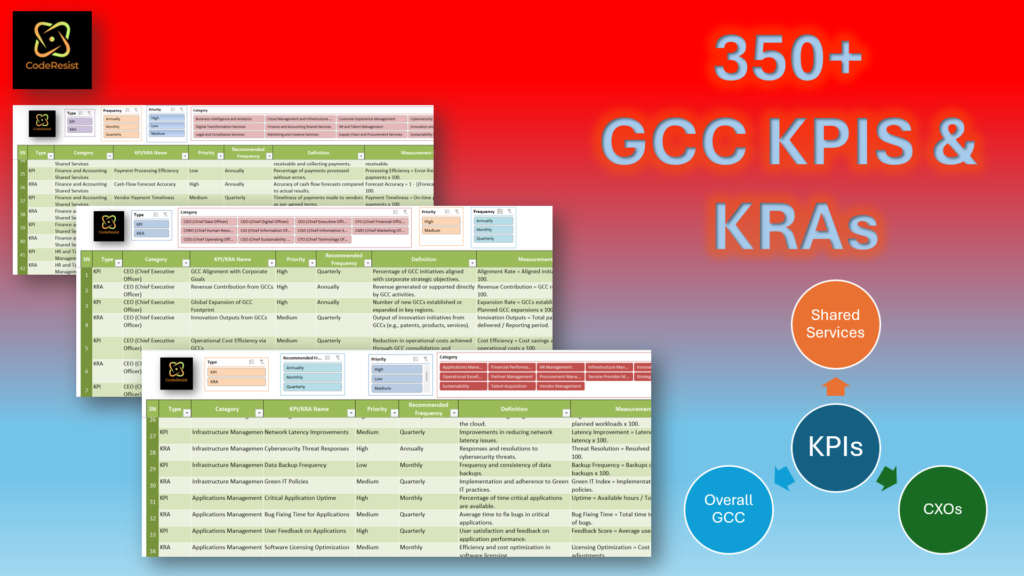Maximizing GCC Success: A GCC KPI Framework for Strategic Growth
Global Capability Centers (GCCs) have emerged as strategic assets for organizations looking to achieve cost efficiency, foster innovation, and enhance operational excellence. However, despite their potential, many GCCs fail to deliver expected results due to misaligned objectives, unclear strategies, and inadequate performance measurement frameworks.
This article delves into the challenges organizations face in managing GCC performance, explores the importance of aligning strategies with measurable outcomes, and introduces a research-driven KPI framework to help businesses realize the full value of their GCC investments.
Must Read: What is GCC Maturity Framework ?
Why GCC Performance Management Fails
Many organizations establish GCCs with ambitious goals but often struggle to quantify success. Challenges include:
Undefined Success Metrics: Without clear and actionable KPIs, it’s difficult to measure the GCC’s impact. For example:
- Finance teams might focus on cost savings.
- IT teams might prioritize uptime and cybersecurity.
- HR departments may aim to improve talent retention.
The absence of a unified framework results in siloed metrics that fail to reflect the GCC’s overall contribution.
Misaligned Strategies: GCCs are frequently viewed as cost centers rather than strategic enablers. This perception limits their ability to drive innovation or contribute to broader business objectives.
Inadequate Stakeholder Engagement: Key stakeholders, including CXOs, often lack tailored KPIs to evaluate GCC performance in areas that align with their strategic priorities.
Join LInkedin Group – Global Capability Center- GCC Leaders Network (News, Trends, Insight and Opportunities)
The Research-Driven Solution: A Comprehensive GCC KPI Framework
To address these challenges, our research identifies key performance indicators (KPIs) and key result areas (KRAs) across operational, business unit, and executive levels. This framework enables organizations to:
- Track performance metrics that align with corporate goals.
- Measure the GCC’s impact on specific business units.
- Provide CXOs with actionable insights into the success of their investments.
Strategies to Achieve Success through GCC KPI & KRA
Here are actionable strategies based on our research:
1. Set Clear Objectives for GCCs
GCC objectives must align with enterprise-wide goals. Examples include:
- CFOs: Focus on cost savings and ROI.
- CIOs: Prioritize process digitization and technology standardization.
- CTOs: Drive innovation through advanced technologies.
- CMOs: Enhance customer engagement metrics.
- CHROs: Improve talent retention and workforce productivity.
2. Adopt a Multi-Tiered KPI Framework
A research-backed framework ensures metrics are meaningful at every level:
- Operational Teams: SLA adherence, ticket resolution times, process efficiency.
- Business Units: Revenue contributions, cross-functional collaboration.
- CXOs: Innovation outputs, digital transformation impact, and scalability.
3. Measure Regularly and Proactively
Real-time dashboards and analytics tools provide ongoing visibility into GCC performance, enabling swift corrective actions when needed.
4. Tailor Insights for CXOs
Each CXO requires specific KPIs:
- CEOs: Evaluate GCC alignment with corporate strategies.
- CFOs: Measure ROI and cost efficiency.
- CIOs: Assess cloud adoption and cybersecurity readiness.
- CHROs: Monitor employee satisfaction and leadership development.
5. Identify Impacted Business Units
Understanding which teams benefit most from GCC operations is critical. For instance:
- Finance: Cost optimization and financial reporting accuracy.
- IT: Uptime, security, and innovation initiatives.
- HR: Talent acquisition and engagement.
Unlocking GCC Value Through Measurable Success
Organizations with a well-defined KPI framework can turn GCCs into strategic powerhouses. By aligning objectives, tracking meaningful metrics, and empowering CXOs with tailored insights, businesses can maximize the value of their GCC investments.
Benefits of a Research-Driven KPI Framework
- Enhanced Operational Efficiency: Streamlined processes and cost savings.
- Strategic Alignment: GCCs as innovation hubs rather than cost centers.
- Informed Decision-Making: Real-time metrics for proactive management.
- CXO Empowerment: Clear insights into GCC contributions to overall success.
Challenges to Implement Realistic and Actionable GCC KPIs
Implementing realistic and actionable KPIs in organizations, especially for Global Capability Centers (GCCs), presents several challenges. One of the primary issues is the lack of strategic alignment, where KPIs are developed without connecting them to broader organizational goals. Vague objectives further complicate this, making it difficult to translate ambitious goals like “drive innovation” into measurable outcomes. Additionally, siloed approaches often result in disconnected KPIs across teams, limiting a holistic view of performance.
Organizations frequently focus on easily measurable quantitative metrics, neglecting intangible outcomes like innovation and customer loyalty. Challenges also arise from delayed reporting due to outdated tracking systems, resistance to change, and an overwhelming number of KPIs, leading to confusion and diluted focus. Unrealistic targets, inadequate communication, and poor stakeholder engagement exacerbate the problem, making it harder to measure success effectively.
Moreover, KPIs often fail to adapt to evolving business dynamics or market conditions, resulting in outdated metrics that do not reflect current priorities. Limited integration with modern tools and inconsistent reviews further hinder performance tracking. To overcome these challenges, organizations must align KPIs with strategic goals, leverage both quantitative and qualitative metrics, foster collaboration across functions, and ensure regular reviews. With the right framework and technology, organizations can establish effective KPIs that drive GCC success and align with broader business objectives.
GCCs have the potential to revolutionize business operations, but their success depends on the ability to measure and manage performance effectively. With our research-backed KPI framework, organizations can bridge the gap between strategy and execution, ensuring their GCCs deliver measurable, sustainable value.
By aligning objectives, defining performance metrics, and tailoring insights for all levels, businesses can transform their GCCs into strategic enablers of innovation, efficiency, and growth. The future of GCCs lies in their ability to integrate seamlessly with global strategies—and with the right KPIs, they can exceed expectations and deliver unparalleled value.
Optimize Your GCC Investments Today
If you’re ready to take your GCC performance to the next level, start by implementing a tailored KPI framework. With the right tools, insights, and strategies, your GCC can become a cornerstone of your organization’s global success.












